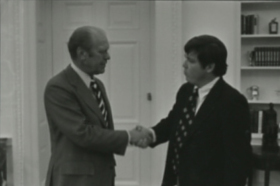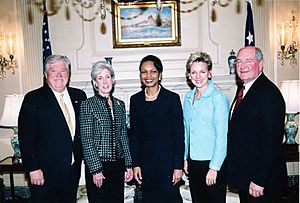Haley Barbour facts for kids
Quick facts for kids
Haley Barbour
|
|
|---|---|
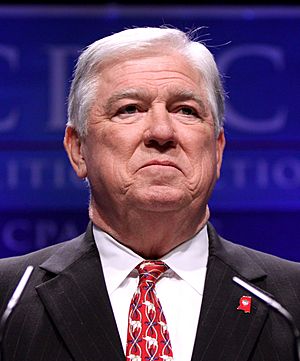 |
|
| 63rd Governor of Mississippi | |
| In office January 13, 2004 – January 10, 2012 |
|
| Lieutenant | Amy Tuck Phil Bryant |
| Preceded by | Ronnie Musgrove |
| Succeeded by | Phil Bryant |
| Chair of the Republican National Committee | |
| In office January 29, 1993 – January 17, 1997 |
|
| Preceded by | Richard Bond |
| Succeeded by | Jim Nicholson |
| White House Director of Political Affairs | |
| In office June 17, 1986 – March 16, 1987 Serving with Mitch Daniels, Frank Donatelli
|
|
| President | Ronald Reagan |
| Preceded by | Bill Lacy |
| Succeeded by | Frank Lavin |
| Personal details | |
| Born |
Haley Reeves Barbour
October 22, 1947 Yazoo City, Mississippi, U.S. |
| Political party | Republican |
| Spouse |
Marsha Dickson
(m. 1971) |
| Education | University of Mississippi (JD) |
| Signature |  |
Haley Reeves Barbour (born October 22, 1947) is an American lawyer and politician. He served as the 63rd governor of Mississippi from 2004 to 2012. He is a member of the Republican Party. Before becoming governor, he was the chairman of the Republican National Committee from 1993 to 1997.
Born in Yazoo City, Mississippi, Barbour went to the University of Mississippi. He earned both his undergraduate and law degrees there. He was very active in the Republican Party in the 1970s and 1980s. Many people say he helped build the Republican Party in Mississippi. In 1982, he ran for the United States Senate, but he did not win.
In 2003, Barbour became the second Republican governor of Mississippi since the Reconstruction era. He won against the Democratic governor, Ronnie Musgrove. As governor, he led the state's response to major events. These included Hurricane Katrina and the Deepwater Horizon oil spill in 2010. These were two of the biggest environmental disasters in Mississippi's history. Barbour was considered a possible candidate for president in 2012, but he decided not to run.
After leaving office, Barbour returned to his work as a lobbyist. He is a senior partner at BGR Group, a company he helped start in 1991. He is known as a very successful lobbyist in Washington, D.C. He has worked for foreign governments and large companies.
Contents
Early Life and Education
Haley Barbour was born in Yazoo City, Mississippi. He was the youngest of three sons. His father, a lawyer, passed away when Haley was two years old. Haley's father was a judge. Later, as governor, Haley pardoned a man who had helped raise him after his father's death.
His brother, Jeptha Fowlkes Barbour III, was elected mayor of Yazoo City in 1968. He served as mayor until 1972.
Haley Barbour attended the University of Mississippi School of Law. He received his law degree in 1972. After law school, he joined his father's old law firm in Yazoo City. He also worked with his cousin, William H. Barbour Jr., who later became a federal judge.
Early Political Work
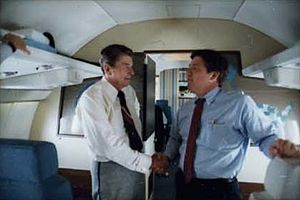
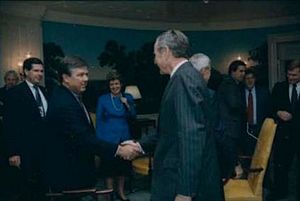
Barbour quickly became active in the Republican Party. He helped with Gerald Ford's presidential campaign in 1976. He also worked on the campaign for former Texas governor John Connally in 1980. In 1982, Barbour ran for the U.S. Senate in Mississippi. He lost to the long-serving Democrat, John C. Stennis.
Barbour later worked as a political advisor in the Reagan Administration. He also helped with George H. W. Bush's presidential campaign in 1988. Before becoming governor, Barbour was well-known in national politics.
Lobbying Career and Influence
Barbour is known as one of Washington's most influential lobbyists. A lobbyist is someone who tries to influence government decisions on behalf of a group or company. In 1991, Barbour helped start a lobbying firm now called BGR Group. This firm works for many large companies and even some foreign countries.
In 1998, Fortune magazine called Barbour Griffith & Rogers the second most powerful lobbying firm in America. In 2001, it was called the most powerful. The firm has worked for various industries, including oil and tobacco companies.
In 2014, Barbour and his nephew, Henry Barbour, created a political action committee (PAC). This PAC supported Senator Thad Cochran's successful re-election campaign.
Leading the Republican National Committee
In 1993, Haley Barbour became the chairman of the Republican National Committee (RNC). The RNC is a main organization for the Republican Party. In 1994, while he was chairman, Republicans won control of both the House of Representatives and the Senate. This was the first time Republicans had controlled the House in 40 years. Barbour left his position as RNC chairman in 1997.
Governor of Mississippi
2003 Election Campaign
After working in Washington, D.C., for two decades, Barbour decided to run for governor of Mississippi in 2003. He won the Republican primary election on August 5, 2003. His nephew, Henry Barbour, managed his campaign.
During the campaign, Barbour spoke at a fundraiser called the Blackhawk Rally. This event was hosted by a group called the Council of Conservative Citizens. Some people criticized Barbour for speaking at this event. However, Barbour said he would not ask for his picture to be removed from the group's website. He said he believed in free speech and that his picture was public. His opponent, Governor Ronnie Musgrove, also said he had attended similar rallies in the past.
Barbour won the general election on November 4, 2003. He received 53 percent of the votes, defeating Governor Musgrove. Barbour became only the second Republican governor elected in Mississippi since the Reconstruction. He took office in January 2004.
Managing State Finances
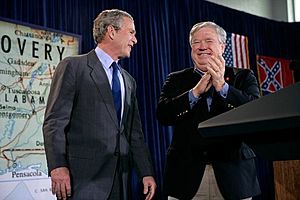
When Barbour became governor, Mississippi had a large budget deficit. A deficit means the state was spending more money than it was taking in. Barbour worked with both political parties to create a plan called "Operation: Streamline." This plan aimed to cut the budget deficit in half without raising taxes. He did this mainly by reducing spending on some social services.
The state's finances improved, partly due to increased sales tax revenues after Hurricane Katrina. In 2006, Mississippi achieved its first balanced budget in years. By 2008, the state fully funded its education program for the first time since it began in 1997.
Barbour also supported a new law to change how lawsuits were handled in the state. This was called "tort reform." He said this would help businesses and create jobs. Mississippi's tort reform laws became some of the strictest in the country.
Hurricane Katrina Response
On August 29, 2005, Hurricane Katrina hit Mississippi's coast. It caused a lot of damage, killing 231 people and destroying the state's casino industry. Tens of thousands of people lost their homes.
Barbour's response to the hurricane was praised. He focused on evacuating people and was firm about preventing looting. Many people saw him as a strong leader who could communicate calmly during a crisis. He worked to help southern Mississippi recover from the storm.
Barbour encouraged rebuilding the coast in new and better ways, not just as it was before. He wanted to create stronger, more organized communities.
Tobacco Tax Decisions
Barbour faced some criticism for not approving a bill to increase the state's cigarette tax. At the time, Mississippi had one of the lowest cigarette taxes in the country. He argued that the proposed tax changes would not bring in enough money and could harm the state's budget, which was already struggling after Hurricane Katrina. He had also promised during his campaign not to raise taxes.
In May 2009, Barbour signed a law that increased the cigarette tax for the first time since 1985. The tax went from 18 cents to 68 cents per pack. This change was expected to bring in more than $113 million in new revenue for the state.
2007 Re-election Campaign
On February 8, 2007, Barbour announced he would run for a second term as governor. He promised not to create any new taxes or raise existing ones.
Barbour won the Republican primary election on August 7. He then defeated Democrat John Arthur Eaves Jr. in the general election in November.
Views on Race and History
Barbour faced some criticism regarding his approach to racial issues. In 2006, he did not pardon Clyde Kennard, an African-American civil rights pioneer. Kennard had been wrongly convicted of a crime in 1960. Instead, Barbour declared a "Clyde Kennard Day" to remember Kennard's struggles and his role in the civil rights movement. Barbour later supported a court review that overturned Kennard's original conviction.
Barbour played an important role in getting state support for the Mississippi Civil Rights Museum. He proposed creating a state commission to plan the museum in 2006. In 2007, he said the museum was "overdue." The project faced delays, but Barbour continued to support it. In April 2011, the museum received $20 million in funding from the state legislature after Barbour spoke in favor of it.
In December 2010, Barbour was interviewed by The Weekly Standard magazine. He spoke about growing up in Yazoo City during the civil rights era. He said he didn't remember it "being that bad." He also mentioned the White Citizens' Council, saying they helped keep the Ku Klux Klan (KKK) out of Yazoo City. He described the Councils as "an organization of town leaders." These comments caused a lot of discussion, and some critics said he was downplaying history. In response, Barbour later stated that Citizens' Councils were "indefensible."
Other Activities as Governor
In September 2008, some Democrats accused Barbour of trying to influence the 2008 United States Senate race. They said he placed the candidates at the bottom of the ballot, which was against state law. A court ordered Barbour to follow the ballot laws.
In April 2009, Barbour joined other Republican leaders to discuss party policies. This group included former governors Mitt Romney and Jeb Bush, and Senator John McCain.
On June 24, 2009, Barbour became the chairman of the Republican Governors Association. This group helps Republican governors across the country.
In March 2010, Barbour and his wife participated in events with First Lady Michelle Obama. They promoted the Let's Move! campaign, which aimed to fight childhood obesity.
Pardons in 2012
On his last day as governor in 2012, Barbour granted pardons or early release to 203 people. A pardon means a person is forgiven for a crime. This included people convicted of various serious crimes. This number of pardons was much higher than previous governors.
A Mississippi judge temporarily stopped the release of some inmates who had been pardoned. The Attorney General, Jim Hood, argued that the state constitution required public notice in a newspaper before a pardon could be granted. Hood also criticized Barbour for not telling the victims' families before granting the pardons. Barbour said that most of the people he pardoned had already been released from prison years earlier. He said he acted to help them find jobs, get licenses, and vote. He also stated that in most cases, his decision was based on recommendations from the parole board.
The Mississippi Supreme Court later upheld the pardons on March 8, 2012. The court said it was up to the governor to decide if the publication rule was met.
Life After Governorship
After leaving office, Barbour returned to his law and lobbying work. He joined a law firm in Jackson, Mississippi, and rejoined his lobbying firm, BGR Group.
In June 2012, Barbour suggested that the Republican Party should take a more moderate approach on some issues. He suggested changes to campaign finance rules. He also said the party should soften its stance on illegal immigration and reach out to Latino voters.
In January 2018, Barbour was stopped at an airport with a loaded handgun in his briefcase. He said he had forgotten it was there and paid the fine.
Awards and Recognition
In 2009, Barbour received an honorary award from the University Philosophical Society in Dublin, Ireland. On January 5, 2012, the Mississippi Emergency Management Agency headquarters building was named in his honor.
On October 18, 2012, The Center for Manufacturing Excellence at the University of Mississippi was also named in his honor.
See also
 In Spanish: Haley Barbour para niños
In Spanish: Haley Barbour para niños
 | Lonnie Johnson |
 | Granville Woods |
 | Lewis Howard Latimer |
 | James West |


